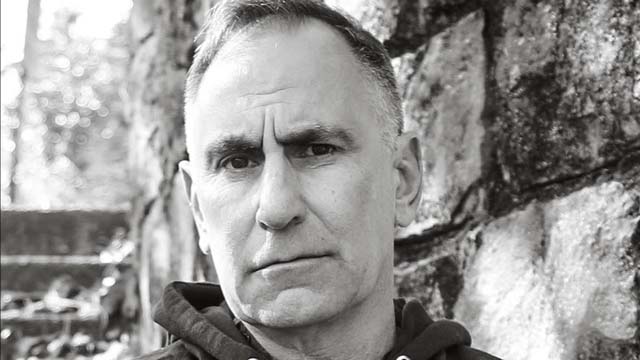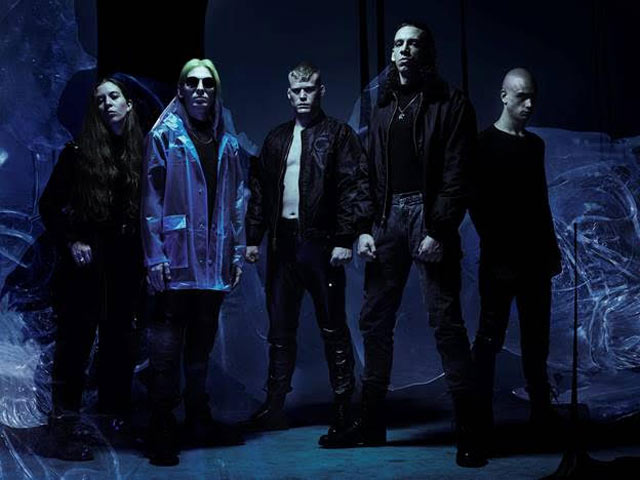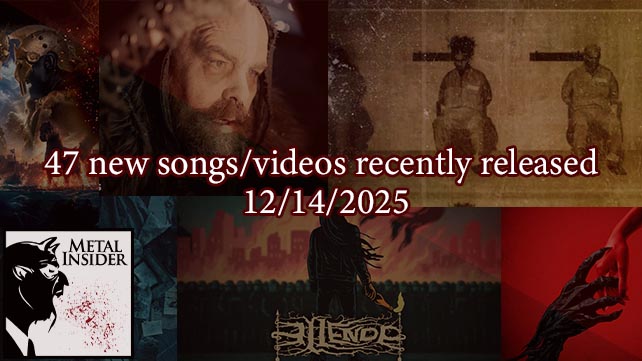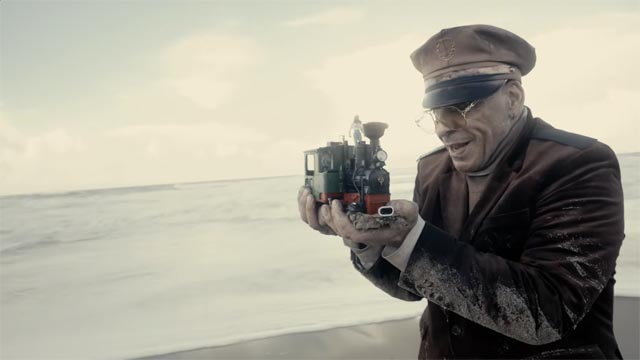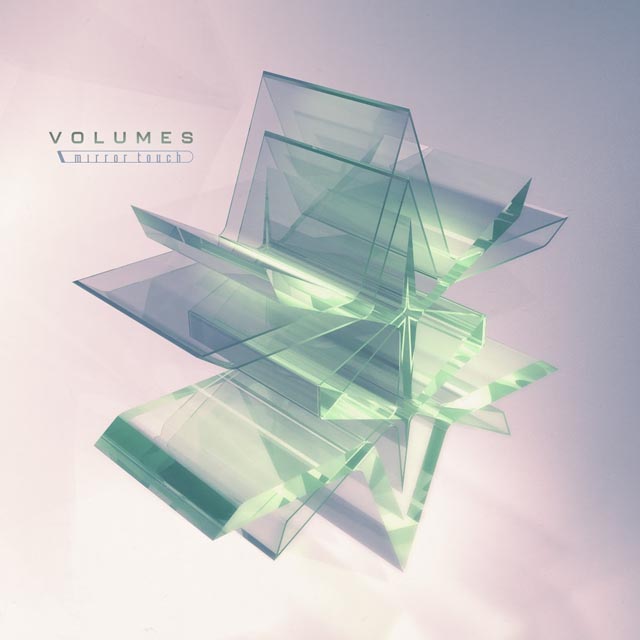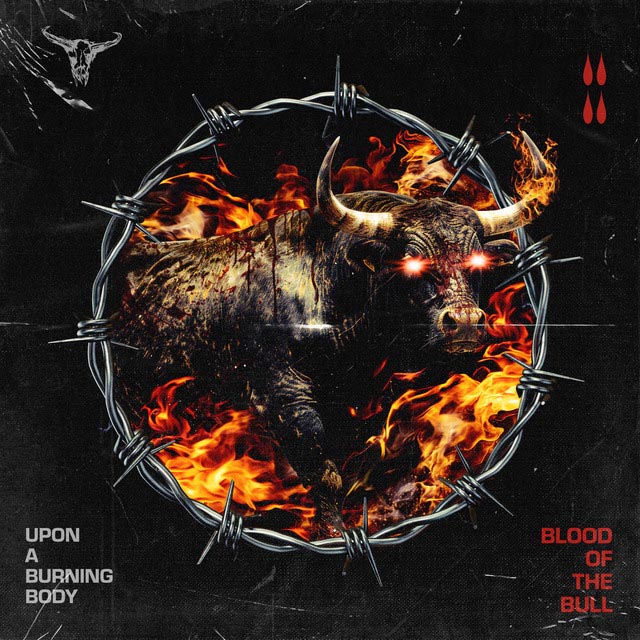You’re not going to have to wait long into 2017 before getting one of the most furious albums. Code Orange’s third album and Roadrunner debut, Forever, will be released on January 13th. And while the intensity of the Pittsburgh hardcore band never wavers, there are flourishes of electronics and some clean vocals as well, making it their most diverse record yet. Sitting in a Roadrunner conference room, the band’s Jami Morgan and Reba Myers seemed happy to talk about the new album, but also focused and determined, talking about the hardcore scene they grew up in, and playing the last Mayhem Festival, and opening for bands like Deftones. The band will be capping the year off with a show in Toronto on December 17th, and kicking off a tour with Youth Code next month.
We are sitting here at Roadrunner Records, your new label home. What made you decide to go to Roadrunner?
Jami Morgan: Well, we met them a couple years ago, probably right after the last record came out and they had people start coming to our shows. We weren’t sure what direction we wanted to go when it came to that sort of thing, but it mainly came down to was that in the past, they had a lot of bands that we really respect and at a time when heavy music was more thriving and metal music was infused with hardcore and punk. From the 80s to the mid-90s, there were a lot of bands that we all really like.
When we were talking to them, our main thing we said over and over was “it’s gotta be very clear, no sneaky shit, that we are able to do what we want to do. We are able to write whatever we want to write. We can record with who we want to record with. We do our own art, our own shirts. We do our own everything.” If we weren’t able to do that, then we would not have signed with anybody. It really doesn’t matter who the label was, but they came with that and they came with the guys who really pushed our sh*t out there.
Reba Myers: They just let us creatively do our thing. That was the main thing we were worried about. We would not have gone with it if it was not the case.
Were you actively looking for another label or would you have stayed with Deathwish?
JM: I don’t know if we would have stayed with Deathwish because there was different stuff going on there, but we had a good run on Deathwish and they helped us a ton. They did a ton of stuff for us and we still record with Kurt, who we met through Deathwish. We have a ton of relationships with Deathwish. I still have a good relationship with Tre, who works at Deathwish. I don’t think we would have stayed with Deathwish, probably, but we don’t want to be running around looking for anything. We are just doing our thing, pushing it as hard as possible, working as hard as possible. The options started coming because when you work hard and are doing something different, the options come. You know what I am saying?
Was there a bidding war?
JM: We talked to labels. We talked to different labels, but it wasn’t about numbers. We were smart about everything we did, very smart about everything we did with the deal. At the same time, there are other awesome labels out, but when we talked to these people what they can provide when it comes to promotion and what they were going to let us do. The marriage of those two things was exactly what we wanted. We wanted to be promoted like we not a parlor trick band or whatever band. At the same time, we want to do what we want to do. That is a hard balance to find. That is a balance that you don’t find and we found it.
What do you think you are going to be able to do on Roadrunner that you weren’t able to do before? What opportunities are opened up?
JM: We want to get as many opportunities as we can. We wanted to be on a platform that would help us push the ideas and the visuals and everything that we want to push. Honestly, the record is the record we were going to make on Deathwish or wherever the fuck we were going to make it. If people like, don’t like it, that’s on us. At the same time, we want the opportunity to be able to step into some different worlds and also play in our world. A lot of what you find when you don’t have that platform is that middle world that is occupied with all these shitty bands that have been doing this thing for the past ten years. I don’t know what it is called, but this kind of Warped Tour-y kind of world, and there is nothing wrong with that, but we want to be able to do stuff with bands that we really respect and the platform is going to help that a lot.
Bands you really respect, throw a couple names at me.
JM: We just toured with Deftones and that was really cool. Our goal overall is to do something different. We aren’t running from our world, which is hardcore. We aren’t trying to escape and get in to some bigger world. We want to take our world and meet it with a lot of this other stuff. Roadrunner has done it in the past with everyone from Sepultura, Type O, to when they were doing Madball, Earth Crisis, Life of Agony, bands that are more influenced by hardcore, but they were doing something a little different. That is something we really look up to. For us, it is band to band, You can’t have anything but respect for Deftones. That was a dream. We got to tour with Killswitch Engage, but we don’t feel like, even if they are big, we don’t want to be touring with these bargain bin fucking deathcore bands. You know what I mean? There is nothing in the future for it. It is a quick buck. We are not looking for a quick buck. We are not here for a quick buck. We are here for the long haul.
This is going back a few years, but you were Code Orange Kids and dropped the “kids” from your name. Was that a statement?
JM: Not really. We started the band at 14-years-old. Me and her [motions to Reba] met when we were about 13-years-old in seventh grade. That’s when we started the band. We finished out a vibe, finished out an artistic idea that we had when were 14. When we were 17,18, we had a new one. It wasn’t so drastically different musically in some way. There are a lot of tracks I like from those times, but we wanted to be able to rebuild the house. Now, we rebuilt the house with the last record and this record we get to dress it up and take it more, some people may say that our older shit is more outside the box, and we know how to do that , so I think we did a lot more around this one.
RM: We were talking about this yesterday, we almost simplified it to a degree, on I Am King. Not in a way that it is less creative, but it got us out there to people who might have thought our older stuff was all over the map, too crazy. It kind of consolidated it all, showed who we really are, and the real foundation of us on I Am King. On this new record, it’s more insane and extreme.
What was the music that brought you together and made you decide you want to play music?
JM: Punk, goth, hardcore, metal, anything we could get our hands on at age 13. We used to like Operation Ivy, we used to go to Anti-Flag shows, Behind Enemy Lines in Pittsburgh. We started meeting people that were more into hardcore and in different kinds of ways. Pittsburgh is a very… when we play hardcore shows in these cities, and they are all going by the trends. Maybe when we did our record last year, everyone was in to hardcore and now everyone is like “fuck all that,” Pittsburgh was never like that. It is just one way. It is mixed. There are noise shows, there are punk shows, there are fucking beat down hardcore shows. That’s where we come from. We come from all those things kind of being put into a pot and mixed together in a different way. Not being worried about going with those paces that I feel the rest of the scene is, maybe not worried about, but that is how it is in those bigger cities because you are influenced by all that.
Moving on to the new album, it is definitely the most diverse record that you have made. There’s more of an electronic influence on there. What bands led you to do that and how much have you been experimenting with it before.
JM: I think our guitar player Eric, basically, when we were doing I Am King, our last record, there were little touches on the last album. We have always been interested in weird shit. When we were young, we would always do the loops and the simplest version of that, with what they can do, what they could afford. The last record, he started really diving into getting into learning how to do that stuff, really learning how to do that stuff. So, by the time we go to this one, we kind of knew that we wanted to sprinkle it in here and there. We wanted to layer it and paint the whole record with that kind of stuff. I just thought it was a new tool, a new color that we could use. When you listen to industrial music or hip-hop music, you kind of feel these different sonic vibes. That is why so many people connect to it now because it is so electronic because it is physical. It is literally different, you know? Bands have done it before. Bands on Roadrunner did it. We are trying to do a different thing in a different way. It is a mix of modern technology and throwback; we thought we could use that tool in a different way than other people have used it in the past. Or we could at least learn to. I think this is the beginning of us starting on that. It has been sprinkled in our records before, but now it is a bigger part obviously.
There is also some clean singing on the record, too.
Reba Meyers: Yeah, we have also always been doing that to a degree. We just, with this record, the same as with electronics, our skills are growing with that stuff as we go on, and there is still plenty of room to grow. We have found ways to hone it in so it doesn’t just feel like it is all over the map. Like this year, we are fitting it in, it is all just dark, and makes sense together. Clean singing, there are specific tracks that we have found ways to kind of mix that in with our regular.
Jami Morgan: You need new tools. You can’t just do the same sh*t over and over. We need new tools. We have a table of tools. We have her voice, Eric’s voice, my voice, all these different, it isn’t just guitars and drums. When writing a song it is like what can we use to paint the picture we are trying to paint? Electronics and the different ways, Eric, our guitar player, was getting into that. I think I saw, immediately, one, he is very very talented, two, we just knew it could be different. I thought it would add dynamics to it.
You also again, did this record with Kurt Ballou. Do you think you are going to stick with Kurt? He’s got an amazing sound. You can almost hear a record he produces and tell that it is him.
Jami Morgan: If he were to stick with us, I think our process with Kurt is, everyone’s is different, but ours is very… we are very pushy about what we want to do and very, we have a coherent sound with Kurt now. It is not just a Kurt sound, it is our sound. Our drums sound different, our guitars sound different. He’s the one who knows how to get all of that. I love working with Kurt. This record was a little tough on some aspects because we did half the record was all the music with Kurt and then we went and colored it all up with Will Yip from Philly. Combining that was tough, especially since he uses a physical, giant board that can only be on for so long and that aspect was tough. We had to mix this digital with this kind of real sh*t that Kurt really does. He’s obviously, the most talented; him and Will, I think are like the guys now. We don’t want to work with somebody else. We could have went to some big producer on this one, 100% they would have helped us do that, but we absolutely did not want to do that. We felt like we could get a big sound with these two guys now. I am not worried about these guys of the past. Those two are the guys now. You forget dudes who have done these other records. It is great, I respect it a lot, but I want to be with the guys now, and do something new, not try and run to something because it worked. What works for us, works for us. It doesn’t matter what has worked for other people.
RM: It is the same with our video and with our art. We have been doing that stuff with people that have built their thing up with us. They are getting better. They are getting big. They are going to be right with us the whole time.
JM: I agree with her 100%. Forget “big,” they are getting better. Max is getting better. We work with Max and it is never going to be like when he works with someone else because we are 100% all involved in everything that we do. We are coming up with that idea with Max. When you have a really good creative guy, you’d be surprised how many people just come in and say whatever you want to do. We are not the “whatever you want to do,” we are very hands on. I think that it is frustrating, but it is a strength.
Are you self managed?
JM: We actually have a manager now, Velvet Hammer, but that is a pretty new thing. It has been going good so far. We met them and it was a similar thing to this. They wanted to let us do our thing, but just help us. It was tough to get this stuff, sit here and do this. If we didn’t have this stuff, how is that going to happen? I am gonna get some people to talk to me on the phone, but that’s it. It is not going to happen because so much is going on in this world 24/7. With the internet, why are they going to pay attention to us? They aren’t. We have to make them pay attention to us and people do have to help push that in some type of way.
You guys played what was possibly the last ever Mayhem Fest. Talk to me a little about that. I would imagine It may not have been the best tour.
JM: It was good for us. We killed it. We did great. Was there nobody there? Yeah. There was nobody there. I heard that some of the bigger bands were complaining saying it was because there were no smaller bands. They might have been right. They were a lot of nice guys, but a lot of the bands, there was no culture behind any of the bands.There were a couple, but most of them seemed like they were local bands on this run. We were kind of mixed in there with that and that’s all good, but it helped us. We did very well. It really went to show me that if you put us in that situation, we were very grateful to be put on that tour, to be able to tour with Slayer and King Diamond, it showed me that if you give us a little we are going to take a lot. When we get a lot, it is all ours. We were given a little with that. We were given 11am and we killed that shit. I feel if we can get something then we are going to take those kids. They are going to be our kids.
RM: I mean those people went to that festival, some were just whatever, but those people were looking for new bands. They saw us and they knew this band was actually real , they are here, and they stand out.
JM: And that’s what these festivals have got to do. They have to put more actual bands [on them]. They put the whole system top to bottom, even this, the real bands, you don’t find the real bands the way they think you find them now. You’re not going to find them at a bar and you’re not going to find them on some Internet page. You’re going to find them because it exists in the hardcore scene and these other scenes. There is real shit going on. That’s where they looked to it in the 90s and they are going to look at hardcore and all that stuff again and ask where is all the next shit. You ain’t gonna find it going to some stupid ass show, it is just not there. Maybe there is some one hit wonder band you find doing that because you can turn them into something, but the real bands, like back in the day, they have to find them and put them on this stuff. They have to let them play in front of people whether it’s Nails, Turnstile, Power Trip, Twitching Tongues, or whoever that comes from our world. They exist, and everyone is getting opportunities now because they are all scrambling. They are looking for something because that whole scene they just put all that money into is falling apart. I see that they are scrambling and we aren’t dumb. We get it.
Deafheaven and Power Trip opened for up Lamb of God and Anthrax.
JM: That’s also the reason we need more of that. All those bands, they are starting to realize it. Much respect to Lamb of God and much respect to Deftones, these bands giving these young bands a chance. There are a lot of other bands that are not doing that because they just care about the short term. They just care about what they are getting that night. What is going to make their lives easier because they are older guys, but the culture doesn’t move forward. The next couple years I feel like that is going to change. I feel like those bands are in for a rude awakening because the bands that have been putting on all this shit they don’t draw a dime and it doesn’t work. It doesn’t work long term.
Any thoughts on how the arts might suffer or flourish under President Elect Donald Trump?
JM: I am not worried about the arts. I am worried about regular people who work these shitty jobs. What is going to happen to them, because that’s what we should be worried about. The arts are always going to exist, but I am worried about people who clean this building and the guys over there building [motions out window to a skyscraper being constructed] and going home to their families. I am worried about when they shut the unions down and those dudes are screwed and they voted for Donald Trump. That’s what I am worried about because they are going to do it just like that. Or for her ability [motions to Reba] to do what she needs to do.
RM: Women’s rights and getting paid.
JM: Who knows. Maybe they will say women can’t get birth control or when they start banging on peoples’ doors and finding immigrants and sending peoples’ families back. That’s what I am worried about. When it comes to arts,
RM: Arts will probably flourish.
JM: Arts are going to be fine.
I mean if you look at the 80s, when Reagan was president, so many hardcore metal bands and bands like Public Enemy were born.
JM: All it takes is this (snaps) and it is all gone. So, it starts with everyone who is working and actually doing something. Not us just sitting around and playing music. Thank God we get to do that. We get to do that because they do that. I am worried about those people. I am really hopeful that it is not nearly as bad as people think. I think it is going to get bad. I think it is going to get way worse before it can get better. People think that it is not, but that’s what happens in history. It gets real bad. A lot of those people voted for Donald Trump and it hurts me they are going to be some of the first people to feel it. They are going to feel it before I feel it.
RM: I completely agree. We are going to continue doing our thing. We are all in positions where we have support systems, but there are people out there who are here and are barely scraping along and they are the ones who are going to get hurt first.
JM: We are lucky because again, Joe, used to work in construction, she used to work at the grocery store, we’ve all worked shitty-ass jobs, right now we are touring, and that doesn’t get as effected as much. That is great right now, I am sure we will be screwed in a couple years by it.
What music has impacted you this year?
Jami Morgan: Nail’s record was really good. Full of Hell and the Body was really cool. I think that came out this year that was like a collab.
RM: Closed Casket, Youth Code.


